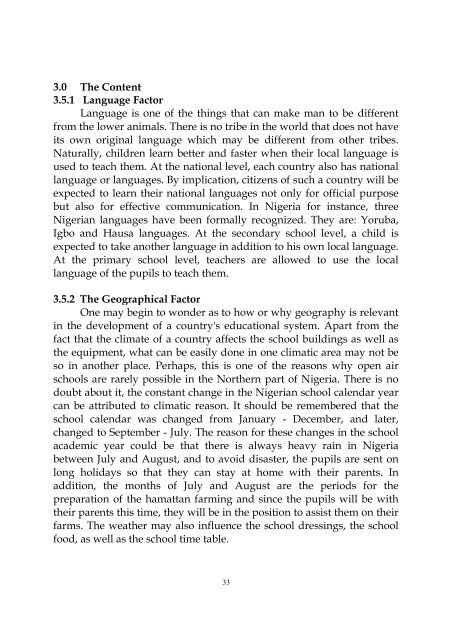edu 304 - comparative education - National Open University of Nigeria
edu 304 - comparative education - National Open University of Nigeria
edu 304 - comparative education - National Open University of Nigeria
You also want an ePaper? Increase the reach of your titles
YUMPU automatically turns print PDFs into web optimized ePapers that Google loves.
3.0 The Content<br />
3.5.1 Language Factor<br />
Language is one <strong>of</strong> the things that can make man to be different<br />
from the lower animals. There is no tribe in the world that does not have<br />
its own original language which may be different from other tribes.<br />
Naturally, children learn better and faster when their local language is<br />
used to teach them. At the national level, each country also has national<br />
language or languages. By implication, citizens <strong>of</strong> such a country will be<br />
expected to learn their national languages not only for <strong>of</strong>ficial purpose<br />
but also for effective communication. In <strong>Nigeria</strong> for instance, three<br />
<strong>Nigeria</strong>n languages have been formally recognized. They are: Yoruba,<br />
Igbo and Hausa languages. At the secondary school level, a child is<br />
expected to take another language in addition to his own local language.<br />
At the primary school level, teachers are allowed to use the local<br />
language <strong>of</strong> the pupils to teach them.<br />
3.5.2 The Geographical Factor<br />
One may begin to wonder as to how or why geography is relevant<br />
in the development <strong>of</strong> a country's <strong>edu</strong>cational system. Apart from the<br />
fact that the climate <strong>of</strong> a country affects the school buildings as well as<br />
the equipment, what can be easily done in one climatic area may not be<br />
so in another place. Perhaps, this is one <strong>of</strong> the reasons why open air<br />
schools are rarely possible in the Northern part <strong>of</strong> <strong>Nigeria</strong>. There is no<br />
doubt about it, the constant change in the <strong>Nigeria</strong>n school calendar year<br />
can be attributed to climatic reason. It should be remembered that the<br />
school calendar was changed from January - December, and later,<br />
changed to September - July. The reason for these changes in the school<br />
academic year could be that there is always heavy rain in <strong>Nigeria</strong><br />
between July and August, and to avoid disaster, the pupils are sent on<br />
long holidays so that they can stay at home with their parents. In<br />
addition, the months <strong>of</strong> July and August are the periods for the<br />
preparation <strong>of</strong> the hamattan farming and since the pupils will be with<br />
their parents this time, they will be in the position to assist them on their<br />
farms. The weather may also influence the school dressings, the school<br />
food, as well as the school time table.<br />
33
















